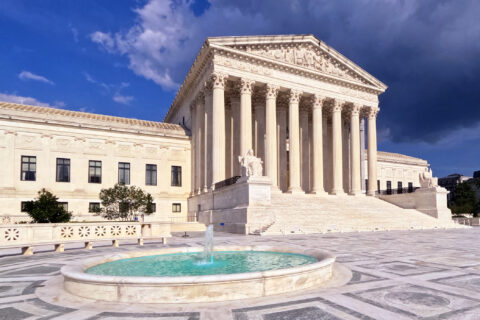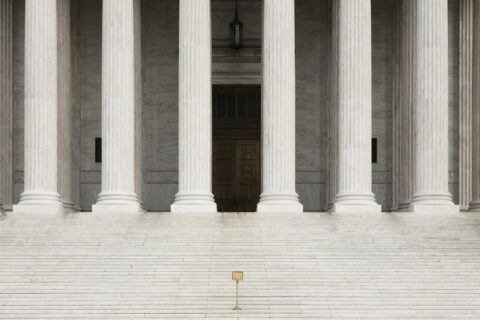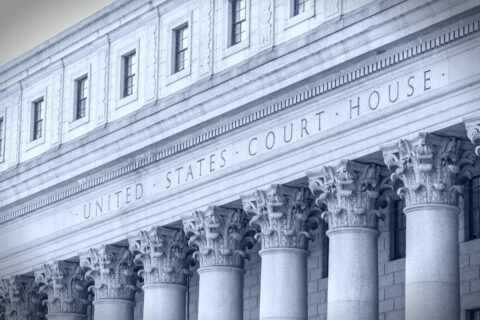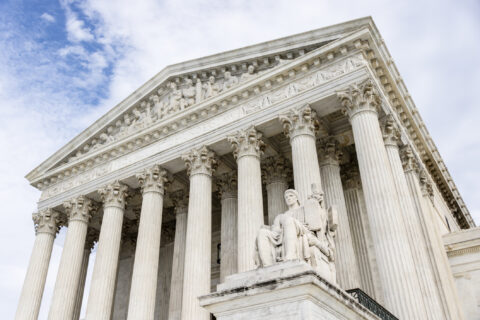Co-authored by Amanda Karras, the Executive Director and General Counsel for the International Municipal Lawyers Association (IMLA). NLC, IMLA and NACo formed the Local Government Legal Center (LGLC) in 2023, a coalition of national local government organizations to provide education to local governments regarding the Supreme Court
In their 2024-2025 term, the Supreme Court of the United States (Court) issued decisions that directly impact local governments on issues including public safety, employment law and the environment. Through our legal advocacy process and in partnership with our founding partner organizations with the Local Government Legal Center (“LGLC”), the National Association of Counties (NACo) and the International Municipal Lawyers Association (IMLA), the National League of Cities (NLC) participated in amicus briefs presenting sound and persuasive legal arguments to the court on principles and issues important to good municipal government.
Key Takeaways
The Supreme Court issued decisions in several monumental cases this Term, including cases related to:
- Public safety. These include regulations pertaining to “ghost guns” and law enforcement’s use of force and the “moment of threat” doctrine.
- The environment. These include the Clean Water Act and NPDES permit requirements as well as requirements under NEPA.
- Employment law. These include majority group discrimination, FLSA claims and claims relating to post-employment retiree benefits.
- Nationwide or universal injunctions, which have direct implications for current litigation regarding grant funding and grant conditions.
This blog breaks down the most significant SCOTUS rulings and their implications for local governments from this past term. Understanding these decisions is essential for local officials to navigate the changing legal landscape and effectively serve their communities.
Bondi v. VanDerStok
This case concerns so-called “ghost guns” or firearm part kits that are sold online to anyone without background checks or serial numbers and can be easily assembled, often in a matter of minutes. The Bureau of Alcohol, Tobacco, Firearms and Explosives (ATF) issued a regulation concluding ghost guns should be considered firearms under the statutory definitions of the Gun Control Act of 1968 (GCA) and therefore be subject to the GCA’s requirements. The question in the case was whether these “ghost guns” should be considered firearms for the purposes of the GCA, which imposes licensing, background check, record keeping and serialization requirements on the manufacturers and dealers of firearms.
The Court held that ATF’s regulation of so-called “ghost guns” did not violate the Administrative Procedure Act (APA) as the firearm part kits could be considered firearms under the statutory definitions of the GCA. This decision means that the manufacturers of “ghost guns” must comply with the same requirements under the GCA to conduct background checks, keep records of sale, and serialize the firearms that other firearm manufacturers must comply with.
This is a win for public safety in local communities as “ghost guns” create significant public safety concerns as they allow minors and felons who are otherwise prohibited from owning guns under the 1968 Gun Control Act to obtain them. They also create significant roadblocks for law enforcement in investigating violent crimes as they cannot typically be traced as they lack serial numbers.
NLC filed a brief (PDF) in this case with our founding partners of the LGLC.
Stanley v. City of Sanford
The issue in this case was whether Title I of the ADA reaches alleged discrimination against retirees for post-employment retirement benefits when the individual cannot perform the essential functions of the job with or without a reasonable accommodation. In this case, the former employer, who was disabled and could no longer continue in her position, sued her employer based on a change the employer made to its post-retirement health benefits several years earlier (when the employee was qualified and working in the position).
The Court held that to prevail under Title I of the ADA, a plaintiff must be a “qualified individual,” meaning she must “plead and prove that she held or desired a job and could perform its essential functions with or without reasonable accommodation, at the time of an employer’s alleged act of disability-based discrimination.” In this case, the employee could not satisfy this standard when she sued and therefore could not bring a claim under the ADA for the change to the post-retirement benefits policy.
This is a win for local governments as a broad ruling in the petitioner’s favor presented significant implications for the public fisc and post-employment benefit liabilities.
NLC filed a brief (PDF) in this case with our founding partners of the LGLC as well as associate members the Government Finance Officers Association (GFOA) and the International City/County Management Association (ICMA).
Ames v. Ohio Department of Youth Services
This issue in this case concerned majority group discrimination and what the proper evidentiary standard in these employment discrimination cases should be. Because the plaintiff was heterosexual and part of the majority group, the Sixth Circuit required that she also show “background circumstances to support the suspicion that the defendant is that unusual employer who discriminates against the majority.”
The Court unanimously reversed a Sixth Circuit opinion, which made it harder for employees in majority groups who are passed over for promotions or otherwise subjected to adverse employment actions to bring Title VII lawsuits.
A concern for local governments in this case was to prevent a broader ruling that could have undermined the evidentiary burden in employment discrimination cases and how those cases are litigated by overturning a 40-year precedent. The majority did not overturn that precedent, though two concurrences called it into question.
NLC filed a brief (PDF) in this case with our founding partners of the LGLC.
E.M.D. Sales v. Carrera
The issue in this case concerns exemptions to the Fair Labor Standards Act’s (FLSA) overtime and minimum wage requirements and what standard of proof an employer must show to demonstrate an exemption applies. The lower court applied a “clear and convincing evidence” standard, which would make it very difficult for employers to demonstrate that an employee satisfied the exemption. Because violations of the FLSA carry double and sometimes treble damages, this is an important case for local governments.
The Court held that to prove that an exemption to the FLSA’s minimum wage and overtime requirements apply, an employer need only do so by a preponderance of the evidence rather than a more demanding clear and convincing evidence standard.
This is a win for local governments as a contrary rule would have resulted in more liability under the FLSA which comes with double and treble damages and attorney’s fees.
NLC filed a brief (PDF) in this case with our founding partners of the LGLC.
City and County of San Francisco v. EPA
Here, the City and County of San Francisco challenged the Environmental Protection Agency’s (EPA) issuance of a discharge permit containing ambiguous provisions regarding water quality standards. This case seeks clarity in National Pollutant Discharge Elimination System (NPDES) permits and the generic water quality terms that expose permit holders nationwide to enforcement actions while failing to tell them how much they need to limit or treat their discharges to comply with The Clean Water Act (CWA).
Under the CWA, when an entity, including local governments, seeks to discharge pollutants into waters of the United States, that entity must obtain a permit from the EPA to do so. These permits often contain “effluent limitations” — i.e., limitations that provide specific quantities of pollutants that may be discharged. But as was the case here, they also sometimes contain provisions that make the permittee responsible for the overall water quality where the permittee discharges pollutants. The Court refers to these types of requirements as “end-result” requirements. This question here deals with the legality of these “end-result” requirements that do not provide any specific limitations on permittees but instead focus on the resulting quality of the water.
The Court held that the EPA is not authorized to impose “end result” provisions in NPDES permits and instead it is the EPA’s responsibility to “determin[e] what steps a permittee must take to ensure that water quality standards are met.”
This is a win for local governments as it helps ensure local governments understand their obligations under the CWA.
NLC filed a brief (PDF) in this case with our founding partners of the LGLC and the League of California Cities.
Lackey v. Stinnie
The question in this case was whether a party that obtains preliminary relief but never obtains judicially sanctioned relief because of the defendant’s voluntary change in conduct may be the “prevailing party” who qualifies for an award of attorney’s fees under §1988(b). In this case, the Virginia legislature repealed a law being challenged after the parties obtained preliminary relief but before they obtained final relief, mooting the case. Thereafter, the plaintiffs sought attorney’s fees, claiming to be the prevailing party. Interpreting “prevailing party” to allow for attorney’s fees for preliminary injunctions would harm local governments by discouraging local governments from voluntarily changing suspect policies, incentivizing expensive litigation, and draining public resources.
The Court held that a party does not “prevail” under 42 U.S.C. § 1988 for the purposes of attorney’s fees based on obtaining a preliminary injunction, even if the defendant’s conduct later moots the case.
This case was a win for local governments as attorney’s fees awards can be significant, and a contrary result would undermine the public fisc.
NLC filed a brief (PDF) in this case with our founding partners of the LGLC as well as associate member GFOA.
FCC v. Consumers’ Research
This case is brought by a group of consumers, a carrier, and a nonprofit challenging the Universal Service Fund (USF) that collects funds from telecom providers and redistributes them to localities lacking telecom and broadband access, utilizing an intermediary administrative entity which it has appointed to facilitate the program. The challengers argue that such a process and structure results in an unconstitutional delegation of Congress’s taxing authority.
The Court held that the universal-service contribution scheme does not violate the nondelegation doctrine. The Court held “that no impermissible transfer of authority has occurred. Under our nondelegation precedents, Congress sufficiently guided and constrained the discretion that it lodged with the FCC to implement the universal-service contribution scheme. And the FCC, in its turn, has retained all decision-making authority within that sphere, relying on the [USAC] only for non-binding advice.”
This case was a win for local governments as it preserved the USF, which is vital to the public health, safety, and educational welfare of local communities. The decision preserves the E-rate program, Rural Health Care program, Lifeline program, and High-Cost Program.
NLC filed a brief in this case with our founding partners of the LGLC.
McLaughlin Chiropractic Associates v. McKesson Corporation
This case concerns the rights of litigants, including local governments, to challenge certain agencies’ final orders (including FCC final orders) interpreting a statute in district court after the time period required by the Hobbs Act to enjoin such an order has expired. The Hobbs Act provides circuit courts with “exclusive jurisdiction” to enjoin, set aside, suspend (in whole or in part) or to determine the validity of” certain agency orders. The Act gives litigants 60 days to seek to set aside a rule after it is finalized. The issue in this case was whether the Hobbs Act required the district court in this case to accept the FCC’s legal interpretation of a particular statute when that litigant did not meet the Hobbs Act requirements.
The Court corrected the view that entities (whether governmental or private parties) typically have only 60 days to launch a pre-enforcement challenge to agency orders, and only at a federal circuit court. After Mclaughlin, that limited window only applies where Congress has expressly precluded judicial review in a subsequent enforcement proceeding.
This case was a win for local governments that are sometimes unable to challenge FCC and other agency rules within the quick time frames — often 60 days — and then are later sued with an enforcement challenge under that rule. This decision allows localities to at least challenge the agency rule under those circumstances.
NLC filed a brief (PDF) in this case with our founding partners of the LGLC.
Trump v. Casa
As the Court finished up their term, it issued the decision in Trump v. Casa (PDF), the birthright citizenship case. The merits of the birthright citizenship Executive Order were not at issue in this case. Instead, it centered on whether courts can issue universal or nationwide injunctions. The Court held that universal injunctions likely exceed the authority of district courts though there are some caveats to the ruling. Learn more about this case, the Court’s decision and its impact on local governments in our recent CitiesSpeak blog.
Learn More
To learn more about the cases of the term, watch our recent LGLC webinar with legal experts discussing the Supreme Court’s decisions of the term impacting local governments.







